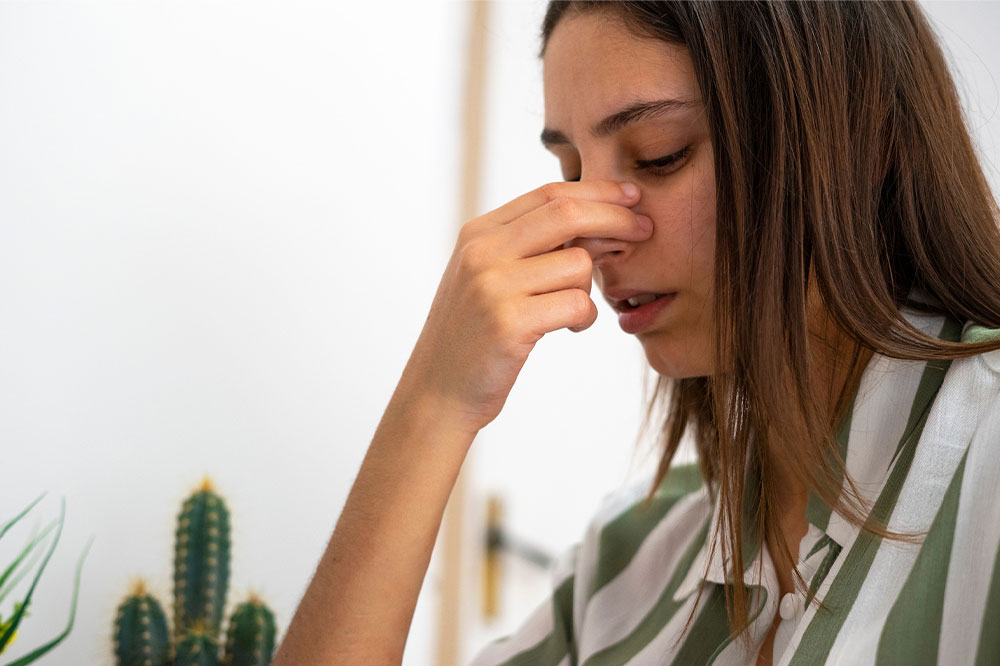Common Symptoms of Nasal Vestibulitis
The nostrils, also called the nasal vestibules, allow air to be absorbed and disbursed from the nasal cavity connected to the respiratory tract. Nasal vestibulitis is an infection of this cavity triggered by bacterial growth that penetrates the skin barrier. It is not a serious condition and can be promptly treated with certain treatment methods and topical remedies. Here are the leading causes and common symptoms of the infection explained.

Common causes of nasal vestibulitis
Most of the known nasal vestibulitis signs and symptoms are triggered due to the following reasons. Know that an underlying bacterial infection is the main cause of the swelling and inflammation that constricts the airway. Here are a few common causes of nasal vestibulitis:
-
Waxing or plucking hair
Nasal hair growth can be a real nuisance at times. But plucking out nasal hair or forcibly waxing these follicles allows bacteria to penetrate the skin and cause an infection. -
Blowing the nose
Blowing one’s nose excessively also puts pressure on the cavity, causing minute ruptures to develop inside the passage. The hot air that is blown out acts as an incubation chamber for the bacteria to thrive in these fissures inside the nasal passage. -
Piercing
Nose piercings, if done improperly, can also cause an infection, especially in the vestibule that holds the hair follicles in place. Therefore, one must be careful about the type of piercing and ensure these accessories are properly sterilized. Someone could also have an allergic reaction to the type of metal that causes the infection.
Symptoms of nasal vestibulitis
Many visible and underlying discomforts triggered by this infection develop overnight or gradually.
- Redness and swelling
The nasal passage is a narrow opening, so any swelling in the area will constrict air flow and cause persistent discomfort. Nasal vestibulitis can trigger severe nasal cavity inflammation, blocking the sinuses and causing shortness of breath. The inflammation also causes tissue to develop red patches triggered by the irritation near the tip of the nose. The redness and discoloration are visible and spread as the swelling intensifies with time. - Severe pain and tenderness
As the inflammation spreads in the nasal cavity, one might also experience severe pain and tenderness in the tissue. This pain is particularly concentrated in the cavity at the tip of the nose. The visible red patches that develop as the condition progresses determine the intensity of the pain. As the infection burrows deep into the muscle tissue, the whole affected area becomes tender to touch. Increased sensitivity is one of the main discomforts associated with this pain and tenderness. - Acne and boils
Acne and boils on the skin’s surface develop due to an accumulation of fluids trapped under the surface. The liquid contains millions of bacteria that spread when the pimple is popped and cause more breakouts. Visible boils on the tip of the nose and acne that develops in close proximity are also other signs of nasal vestibulitis. No set pattern exists, but unexplained acne and boils that develop within a short time indicate a serious underlying problem. - Abscess bumps in the nasal cavity
An abscess is an unpleasant bump filled with pus triggered by a bacterial infection. A skin abscess is a common type of pus-filled growth that develops anywhere on the body. However, when these abscesses develop inside the nasal cavity, it is a sign of nasal vestibulitis. Since these internal abscesses are not visible unless examined closely by an ENT specialist, one must look for signs of discomfort caused by these growths in the cavity. Abscesses can block the airways and trigger a lingering sensation of stuffiness inside the cavity. So never ignore these discomforts, as the pus-filled growths can spread rapidly inside the cavity. - Crustation on the septum
The septum is the part of the nose that divides it into two nostrils. This is a piece of cartilage and bone that bifurcates the nasal passage’s breathing ‘in and out’ function. Nasal vestibulitis can trigger a yellowish crustation to form on the septum, caused by a discharge of excess mucus that dries up in the cavity. These start as small patches that may get dislodged when someone blows their nose. However, if left unchecked, the patches can grow in size and obstruct the cavity. The lingering bacterial infection can also pose a risk for other health complications that can develop in the nasal cavity. - Nosebleeds
Nosebleeds are a very common symptom triggered by several underlying health complications. Moreover, any physical injury to the nasal passage that breaks the septum also causes blood to gush out of the nasal cavity. However, unexplained nosebleeds when someone feels absolutely fine could indicate a deep-rooted problem like nasal vestibulitis.
At any given point in time, if these early nasal vestibulitis symptoms persist, immediately consult with a professional ear, nose, and throat (ENT) specialist. Most of the symptoms can only be confirmed after the doctor conducts a visible exam. Also, delaying treatment increases the risk of known complications like facial cellulitis, blisters, and discoloration that leaves a mark. ENT specialists can prescribe prescriptions and healthy lifestyle changes to overcome the problem upon confirmation.